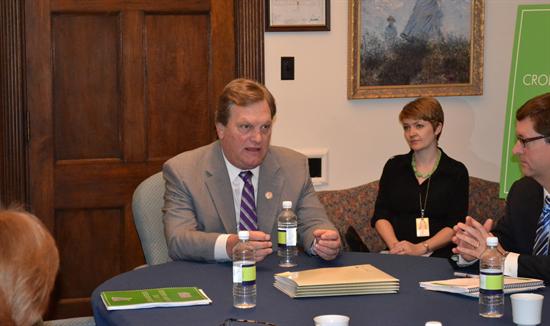
The House’s top energy appropriator appeared to quash any hope that a fiscal 2018 budget being put together in advance of a March 23 federal-funding deadline would contain any money for the proposed Yucca Mountain nuclear-waste repository in Nevada.
In the face of that ominous prediction, Yucca booster-in-chief Rep. John Shimkus (R-Ill.) told news outlets including Politico this week that the funding might yet make it into a omnibus spending bill House Majority Leader Kevin McCarthy (R-Calif.) wants to vote on next week.
The dark, if predictable, cloud over Yucca funding descended after Rep. Mike Simpson (R-Idaho), chairman of the House Appropriations energy and water development subcommittee, told media including Bloomberg News that he had all but given up on providing the Department of Energy (DOE) or Nuclear Regulatory Commission (NRC) with even a portion of the combined $150 million the Donald Trump administration requested for this fiscal year to resume work on the underground repository.
Simpson told Bloomberg that the House, which supports Yucca, is at an “impasse” with the Senate, which does not.
Simpson spoke to reporters on Capitol Hill on Tuesday after the appropriations panel he chairs wrote its portion of what could, news outlets reported this week, become a 2018 omnibus spending bill to give federal agencies besides the Pentagon a permanent appropriation for a fiscal year that will be nearly halfway over when the current stopgap budget bill expires March 23.
Since Oct. 1, 2017, the federal government has run on a series of short-term budgets that have also provided no funding for Yucca Mountain.
The evening before Simpson shared his bleak forecast for nuclear-waste watchers in industry, congressionals descended to the House floor for speeches that, for the most part, supported efforts to get Yucca Mountain back on its feet.
Quarterbacking the Monday-evening floor speeches was Shimkus, who is still waiting for the House to act on a bill he wrote last year to smooth the way for constructing the disposal site for spent reactor fuel and high-level radioactive waste. The measure easily passed the House Energy and Commerce Committee in June on an unambiguously bipartisan 49-4 vote, but it has not sniffed a vote by the full House yet.
Meanwhile, the Trump administration has not given up on its plan to resume the Department of Energy’s application to license Yucca Mountain with the Nuclear Regulatory Commission. As part of a fiscal 2019 budget request sent to Capitol Hill on Feb. 12, the White House requested almost $170 million for Yucca Mountain: some $120 million for DOE and about $48 million for NRC.
That is nearly $20 million more than the White House sought for the NRC’s Yucca activities last year. The funding would roughly double to 124 the number of full-time workers the regulator could afford to put on the licensing effort, relative to what the 2018 request could have provided.
Precisely what DOE would do with the $120 million requested for 2019 is not as clear. The White House still has not released the detailed budget justification for DOE’s Office of Nuclear Energy: the steward of the agency’s Yucca Mountain programs.
However, Energy Secretary Rick Perry could shed some light on the topic next week. The DOE boss is slated to testify about the agency’s latest budget request Thursday in a hearing of the House Appropriations energy and water development subcommittee.